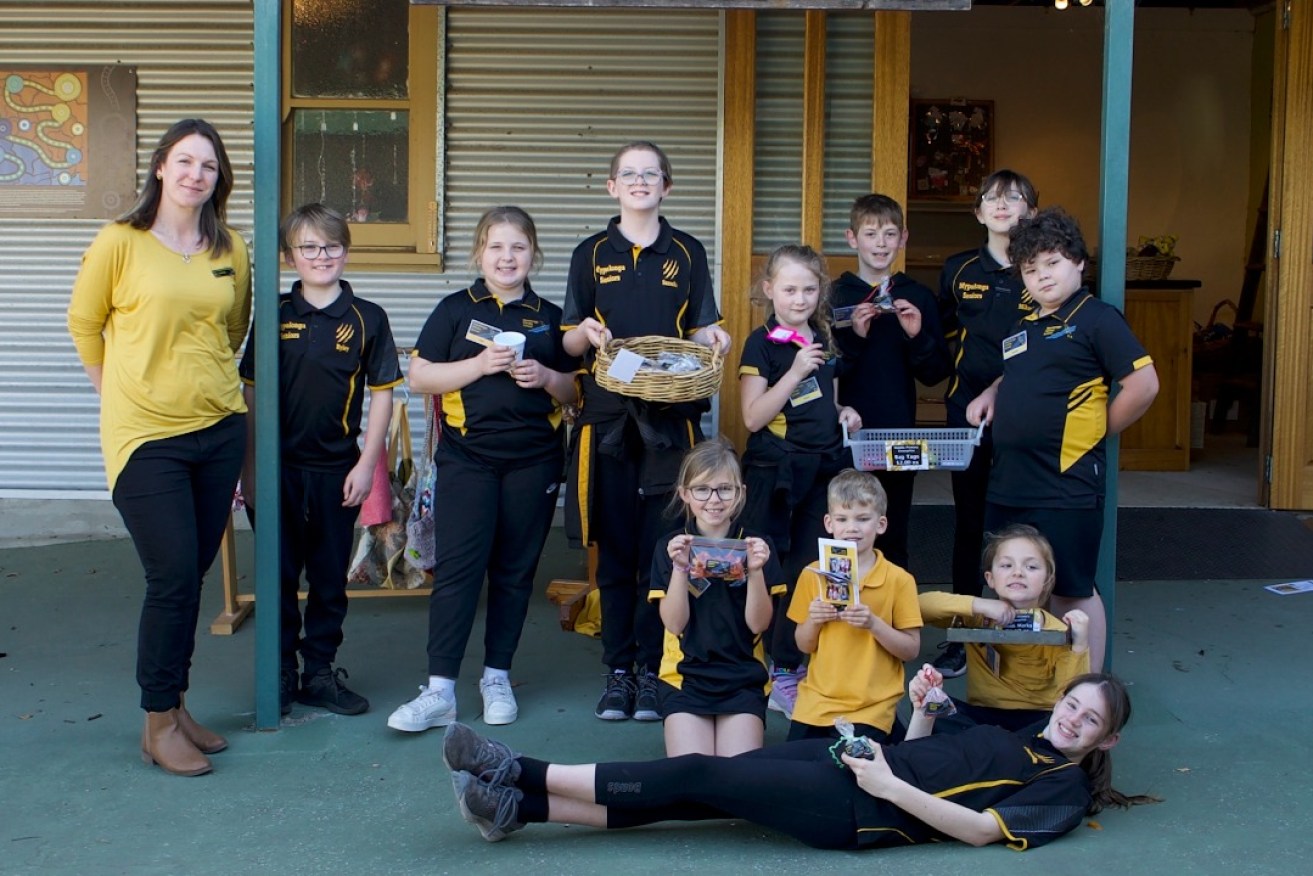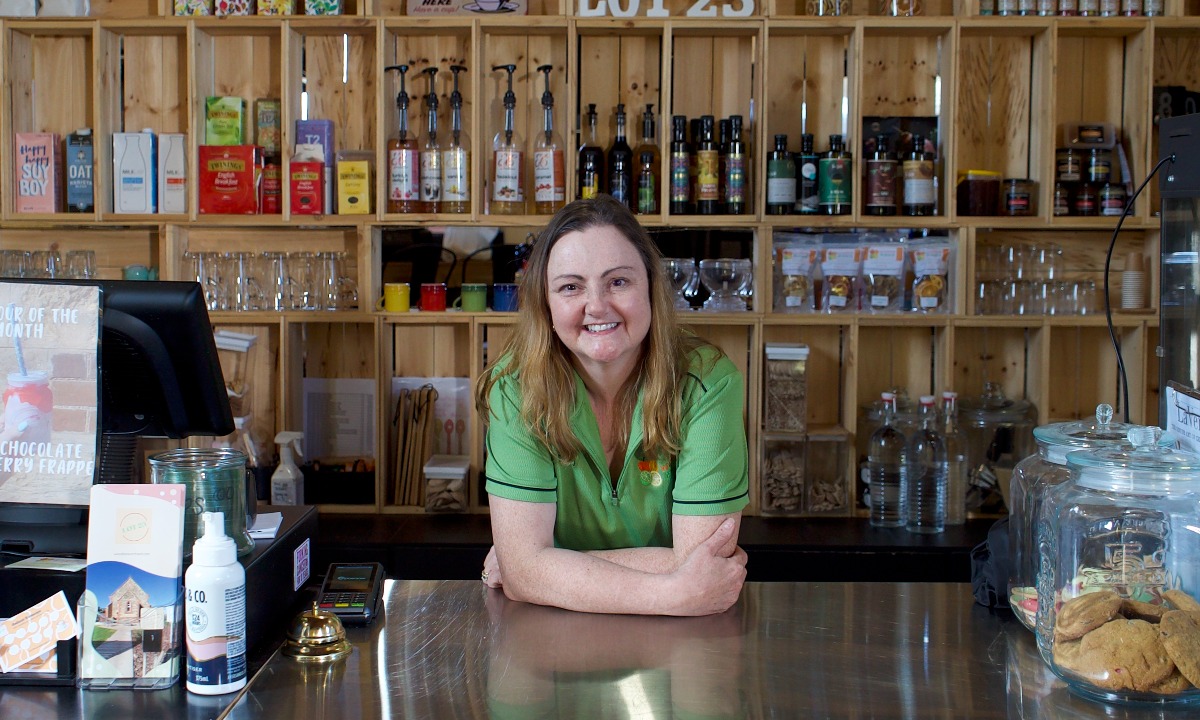The small town with a big food bowl
With its agricultural diversity ranging far greater than should be expected for a tiny town on the River Murray, Mypolonga wins the 2022 Agricultural Town of the Year Award.

The Mypolonga Primary School Shop teaches kids how to run a business. Photo: Lara Pacillo
The “Mypo Small But Mighty” tagline for Mypolonga checks out. With a population of just 475, the town punches well above its weight in agricultural diversity.
What was once a predominantly citrus, stone fruit and milk producing region, Mypolonga is now a thriving and diverse agricultural food bowl growing a vast range of crops and breeding a wide range of livestock.
The town’s horticulture variety stretches from cereals and grains to olives and chilli: avocado and finger limes to pomegranate and figs. There’s livestock breeding of beef cattle, sheep, chickens, pigs and bees, as well as dairies of goat, buffalo and cow.
Beef cattle farmer and chair of the Mypolonga History Museum Jenni Llewellyn says this diversity stems from the efficient irrigation system used in the town.
“We’ve got such a unique system here, no one knows much about it,” Jenni says.
While in the past Mypolonga used an open channel system, the town now uses an enclosed pipe and pressurised pump system. Water is pumped from the south of the town through to the north, and is accessible 24/7 for farmers to irrigate their properties.
“Market gardening is possible now and that’s why all these little niche markets are emerging,” Jenni says.
“People have suddenly realised ‘gee, the water’s already here. I just have to turn on the tap’.
“It’s changed things completely. People can grow whatever they like.”

Woodlane Orchid and Lot 23 owner Kelly Johnson. Photo: Lara Pacillo
The entrepreneurial mindset of the community has reigned free on this. There’s a “think outside the box” mentality where people want to value add, experiment and diversify.
Corey Jones, a 32-year-old farmer, started South Australia’s first buffalo milking herd in 2014.
Over a decade after his family gave up milking dairy cows during the millennium drought, Corey wanted to revive his family farm and tap into a strong market niche while doing so.
“At the time it was milk cows for 30c a litre, or milk buffalo for $2.50 to $3 a litre,” Corey says.
Now making anywhere between $3 to $3.50 a litre, Corey supplies five cheesemakers between South Australia and interstate.
Sticking with cows, the Smart family converted their dairy to full robotics last year, now with over 500 animals and an increase in profits. The dairy is completely robotic, right up to the stage where a drone is used to wake up the cows in the morning.
At Aussie Apricots, Paul and Kathy Prosser diversified their third-generation apricot orchid business, where instead of just growing fruit, they now dry it, dip it in chocolate and create homestyle jams and chutneys.
In doing so, they reduce food wastage by using “imperfect” produce, value add to the product, and support local by purchasing from nearby growers to feed the demand for their business.
Kelly Johnson had sustainability in mind too when she launched Woodlane Orchid in 2019. Collecting surplus and “seconds” produce that would otherwise go to waste, Kelly dehydrates it and turns it into soups, meals, snacks and garnishes. Last year alone, 26 tonnes of surplus produce was used.
“We take whatever is around and we turn it into something fabulous for the people,” Kelly says.
After the success of this, Kelly decided to take things another step further. In February this year, she opened Lot 23, which is a produce-inspired café and tasting room within an old stone church in the town centre.
Here she stocks her line of Woodlane Orchid products, as well as offerings from other businesses in the community. Lot 23 invites locals and tourists to “come and try everything that’s beautiful about Mypolonga”.
Kelly now employs 11 staff between the two businesses just three years on from launching Woodlane Orchid.
She says it’s the primary school to thank for the entrepreneurial spirit that flows through the town, and it’s the very reason she and her young family moved to Mypolonga 20 years ago.
At Mypolonga Primary School, students are taught important life and agriculture skills from a very young age.
Part of this comes from the school shop where students learn how to run a business, starting with making products – such as chocolate dipped apricots – right through to selling them to customers, which includes visitors from Proud Mary river boat tours.
A variety of programs also teach students farming practices, such as how to milk a cow as well as how to grow and cook produce.
Deputy Mayor Wayne Thorley says the school gives kids the confidence to try new things, and this circles back through the community.
“It’s absolutely fantastic the way they’re creating future leaders for their little community and probably the broader community in the future,” he says.
“In resilience, experience and choice, Mypolonga offers a lot.
“It mightn’t be big, but sometimes the best packages are small ones.”
Mypolonga is one of five finalists in the Agriculture Town of the Year Award sponsored by PIRSA to recognise South Australian towns that are excelling in agricultural practices and the flow on effect they have on communities. The winner will be announced at Solstice Media’s Regional Showcase Awards at the UKARIA Cultural Centre on Friday 4 November.




